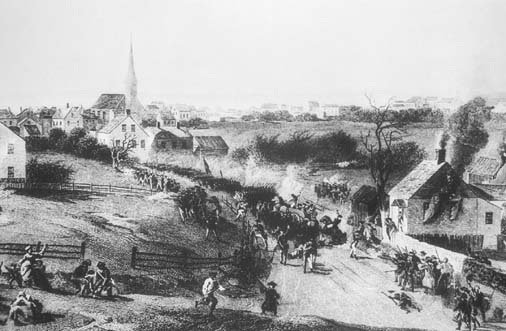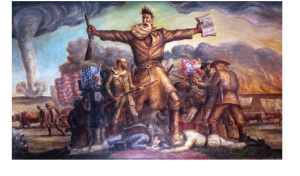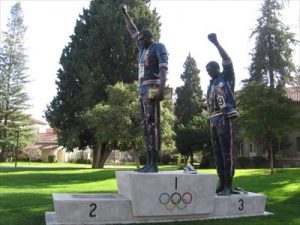“BANG!” The first shots were fired on the village green at Lexington, Massachusetts on April 18, 1775. The British initiated the battle at Lexington, followed by Concord, Massachusetts. There were several events that led up to the Battles of Lexington and Concord, including the Stamp Act of 1765, the Boston Massacre of 1770, and the Boston Tea Party of 1773. These events illustrated the struggles the thirteen colonies had to undergo because of the British Crown and its numerous, restrictive policies. For months leading up to the war, townsmen and farmers of Massachusetts had been training and gathering arms and ammunition in order to be prepared to fight at a minute’s notice; these men were known as minutemen. Continental Congress had approved their preparations and these minutemen sat in wait for the British to make their first move.1

General Thomas Gage, commander of the British Garrison in Boston, had been aware of military preparations in the countryside. Given orders from England to arrest rebel leaders Sam Adams and John Hancock, Gage finally decided to act after learning about the large supply of ammunition in Concord. A detachment of roughly one thousand soldiers headed out from Boston to surprise the colonists and seize the supplies. General Gage’s moves were being closely monitored by the Patriots.2 General Joseph Warren, a spokesman for the anti-British rebels and a member of the committee, began to pay close attention to the British increasingly suspicious movement toward both Lexington and Concord. His attention to detail proved to be a main factor, serving to prepare the minutemen for battle. That night, Paul Revere and William Dawes were assigned to watch the movements of the British and to notify the people in the case of an advance.3 As Revere and Dawes caught sight of the British advancement, they rushed to notify the minutemen. Revere’s famous midnight ride has been immortalized ever since in Henry Wadsworth Longfellow’s poem, “Paul Revere’s Ride.”4

Now, armed with the knowledge that British troops were advancing on Lexington, Captain John Parker and his single company of minutemen stood on the Lexington village green awaiting the British arrival.5 The British arrived and shots rang out. Eight minutemen died and nine were wounded. The Patriots’ attack proved to be fatal to their own militia, but it helped slow down the British arrival to Concord. At this time word reached Concord and the minutemen were able to hide away some of their supplies and prepare for battle. As the British advanced through the ranks of British Major John Pitcairn, the Patriots stood on the Old North Bridge awaiting them. When the two sides came face to face, the first shot—known as the “shot heard round the world”—was fired. This loud statement of retaliation would be pivotal to the Americans, who were in anguish over British rule. The British retreated from Concord where they would encounter multiple surprise attacks from the Patriots.6 Neither side could have predicted that this would be the first battles of what would become the American War for Independence. The British army’s underestimation of the Americans’ resistance proved to be fatal, as they lost many soldiers and ignited something greater. The Patriots would not stop until they had independence; the American Revolution had officially begun.
- Alan Brinkley, American History: Connecting with the Past Volume 2, 15 edition. (Columbia University: McGraw-Hill Education, 2015): 124-126. ↵
- Ormby Gilbert Seeley, Views and Description History of Lexington and Concord, Massachusetts (Lexington, Mass, O.G Seeley, 1901), 12-15. ↵
- American National Biography, 2010, s.v. “Joseph Warren,” by Ethan S. Rafuse. ↵
- Henry Wadsworth Longfellow, Paul Revere’s Ride and Other Poems (New York: Houghton, Mifflin and Company, 1894): 1-5. ↵
- Salem Press Encyclopedia, October 2015, s.v. “Battle of Lexington and Concord,” by Don R. Higginbotham and Richard Adler. ↵
- Funk & Wagnalls New World Encyclopedia, October 2016, s.v. “Battle of Concord.” ↵



25 comments
Ryann Cervantes
Very informative, nice. I had no idea that the minutemen had carried out surprise attacks and had even been trying to hide their munitions and supplies. I had understood that while the minutemen were always ready for the war, they had never engaged the British until the start of the war. While everyone knows the story of the Midnight Ride not many know what led up to it or allowed it to happen.
Cesar Zavala
Great job in describing and mentioning the minutemen who played a vital part in the American Revolution. If it weren’t for their valiant efforts we might have never been able to get rid of the tyranny of the British King. Before reading this article I did not know how the patriots were able to get the upper-hand on the much larger army of the British. Great facts and writing!
Aaron Jaramillo
Great Article! Very well written introduction you had my attention from the beginning. Your article was very informative and easy to follow. I liked how you retold a old story and still have information to keep the reader interested. I can’t wait to read more!
Maalik Stansbury
I love the depth you went into about the Patriots, i think that was cool and had my attention. I love reading about strategy and there was a lot going from both sides. I think you described this very well and informed us in a very intricate way that was fun and an eye opener.
Jacob Hall
What a great way to retell an old story. I never realized that that much happened at the battle of Lexington and Concord. Mostly all we learned in my history classes was that this is where the revolution began, and where the shot heard round the world was fired. However it’s interesting to know how much strategy went into the revolutionists plans, and how greatly the British underestimated them.
Mariana Sandoval
Nice closing sentence! I thought your article was engaging throughout the entire read. It’s great to hear about how the colonists handled their disapproval of the Crown’s restrictions over them. This is very much still instilled in the American people- if we don’t like something, then we do something about it (for the most part).
Tina Valdez
Excellent article! You made the event very interesting to read about. I realized there was strategy involved on both sides, but I am impressed with the Patriots’ strategy in using the minutemen. The first company of minutemen that awaited the British allowed for the other minutemen to prepare for battle. It is interesting to think that this event that more than likely happened all very quickly would initiate the Revolution that we learn about in our classrooms today; just as you said, neither side could have predicted the results of this surprise attack.
Victoria Sanchez
Your article was very informative and an easy/fun read! I didn’t know too much about this specific event, and one of the biggest things I learned was that it was a surprise attack staged by General Gage. This piece of information was definitely interesting and gave me some new insight into the battle strategies used during the war. Great job!
Jose A. Tapia
It was great. I loved the way the story flows. It to the point and descriptive at the same time.
Kassandra Guillen
Great article! You started off with a BANG that caught my attention very well! I have heard of the battles of Lexington and Concord many times throughout history classes, but this article was a very good refresher! The battles of Lexington and Concord and its impact on America is a moment in history that is deserving of our continual recognition.